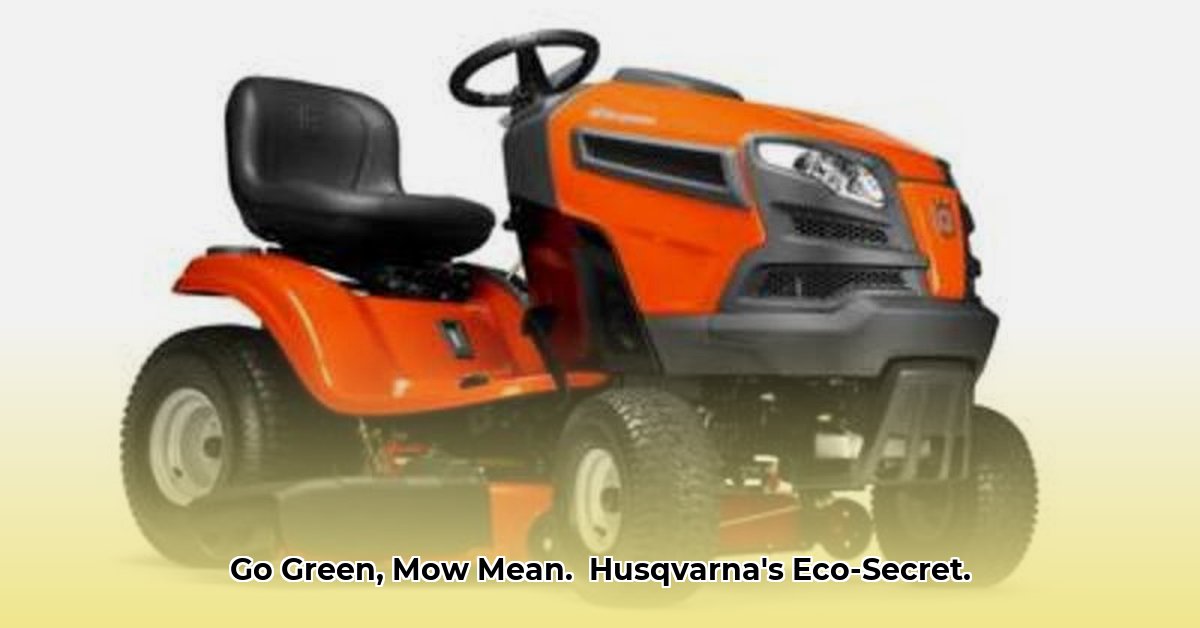
Choosing a lawn tractor is a significant decision impacting your budget, time investment, and environmental footprint. This guide helps you select the perfect Husqvarna tractor for your needs, emphasizing eco-friendly lawn care practices. We'll cover choosing the right mower type, selecting a Husqvarna model, and maintaining it sustainably.
Choosing the Right Mowing Machine: Gas, Electric, or Robotic?
Husqvarna offers gasoline, electric, and robotic lawn tractors, each with advantages and disadvantages. The best choice depends on your yard size, budget, and environmental priorities.
Gasoline-Powered Tractors: These powerful machines excel in large areas, offering speed and efficiency. However, they produce emissions. Husqvarna's gas tractors prioritize durability and longevity, potentially offsetting their higher initial cost over time. Are you prepared to manage the higher emissions for the benefit of superior power and speed?
Electric Tractors: Electric tractors provide a quieter, cleaner alternative, emitting zero direct emissions during operation. Battery life is a key consideration, limiting coverage per charge. Husqvarna's electric models aim for a balance between power and sustainability, ideal for medium-sized yards. Will the limited runtime compromise your mowing efficiency, or is this a suitable trade-off for reduced environmental impact?
Robotic Mowers: Robotic mowers offer fully automated, quiet operation, perfect for smaller, relatively flat lawns. While ideal for convenience and low environmental impact, they're generally less suitable for expansive properties or complex terrains. A Husqvarna robotic mower remains a viable option if your primary concern is quiet, automated operation with a reduced carbon footprint.
Here's a comparative table:
| Feature | Gasoline Tractor | Electric Tractor | Robotic Mower |
|---|---|---|---|
| Power | High | Moderate | Low |
| Battery Life | N/A | 30-60 minutes (variable) | Several hours (variable) |
| Cutting Width | Wide (42-54 inches) | Moderate (34-42 inches) | Narrow (around 20 inches) |
| Price Point | Highest | Mid-range | Relatively High (for comparable area coverage) |
| Environmental Impact | Higher (due to emissions) | Low | Low |
Finding Your Perfect Husqvarna Lawn Tractor: A Step-by-Step Guide
Selecting the right Husqvarna tractor involves careful consideration of your specific needs and preferences. Follow these steps for a seamless process:
Measure Your Lawn: Accurately determine your lawn's size. This is crucial for selecting a tractor with appropriate power and cutting width.
Set a Realistic Budget: Establish a clear budget before browsing models. Husqvarna offers a wide range of price points.
Consider Essential Features: Identify important features such as mulching, bagging, cruise control, and other functionalities that enhance efficiency and convenience.
Read Reviews: Explore online reviews from other users to gain valuable insights into real-world performance of different models.
Test Drive (If Possible): Whenever possible, test drive potential tractors to assess comfort, maneuverability, and ease of use.
Going Green Beyond the Machine: Sustainable Lawn Care Practices
Choosing an eco-friendly tractor is only half the battle. Sustainable lawn care practices further minimize environmental impact:
Mulching: Allow grass clippings to remain on the lawn, acting as natural fertilizer, thereby reducing the need for chemical fertilizers.
Regular Maintenance: Proper maintenance ensures efficient operation, maximizing longevity and minimizing waste.
Responsible Storage: Protect your tractor from the elements during off-season storage, extending its lifespan.
How to Choose the Best Sustainable Lawn Mower for My Yard Size
The ideal mower depends heavily on your yard size and terrain. Husqvarna offers various sustainable options to suit diverse needs.
Understanding Your Needs: Yard Size and Terrain
Before making a decision, carefully assess your lawn's characteristics:
Small Yards (<¼ acre): A lightweight, electric, or cordless Husqvarna walk-behind mower is suitable.
Medium Yards (¼ - 2 acres): A Husqvarna rear-engine riding mower or light-duty tractor offers a good balance of power and maneuverability.
Large Yards (>2 acres): For extensive lawns, a Husqvarna zero-turn mower proves most efficient, although it represents a larger initial investment.
Husqvarna's Sustainable Options: A Quick Comparison
| Mower Type | Pros | Cons | Ideal for |
|---|---|---|---|
| Electric/Cordless | Eco-friendly, quiet, low maintenance | Limited runtime, less power | Small to medium-sized, flat lawns |
| Gas-powered (with advanced engine tech) | Powerful, long runtime | Higher emissions, more maintenance | Medium to large lawns, varied terrain |
| Robotic | Fully automated, eco-friendly | Higher initial cost, limited terrain | Small to medium sized, relatively flat lawns |
Maintaining Your Husqvarna for Sustainability
Regular maintenance is crucial for maximizing the lifespan of your mower, minimizing waste, and promoting sustainable lawn care:
Sharp Blades: Maintain sharp blades for efficient cutting and a healthier lawn.
Clean Air Filter: A clean air filter improves engine performance and fuel efficiency.
Regular Oil Changes: Essential for gas-powered models to ensure optimal performance and longevity.
Proper Storage: Protect your mower from the elements during off-season storage.